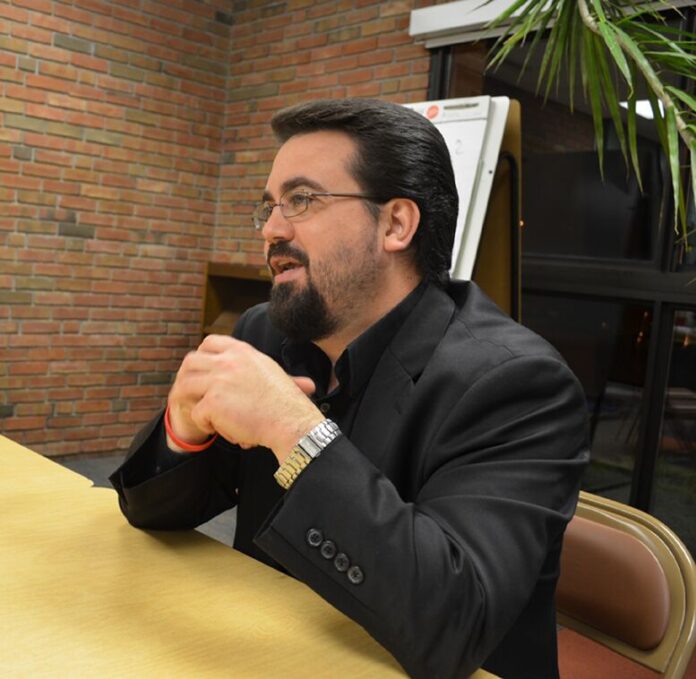After 25 years of preaching about God, hell and salvation, Jerry deWitt just couldn’t take it anymore.
For too long, he said, he’d been preaching messages he didn’t believe.
Last year, he reached a point where he had had enough of living a lie. He quit his job as a Pentecostal pastor, dropped out of church completely and declared to the world that he was a nonbeliever.
“I committed identity suicide,” deWitt said in a talk Dec. 3 in Toledo.
The 43-year-old Louisiana native is traveling the country to promote his book, “Hope After Faith,” scheduled to be published next spring by daCapo Press.
Walking away from his job as a pastor was a gut-wrenching decision, one that deWitt wrestled with for years.
He knew he wasn’t just leaving the ministry, he was leaving the only world he had ever known. Virtually all of his friends and his church community abandoned him, he said. He claims he was fired from his city job by his best friend because of the controversy caused by publicly doubting God’s existence.
DeWitt, well-spoken with a strong southern accent, spoke informally to 10 people from the Great Lakes Atheists and the local branch of Recovering From Religion, seated around conference tables in a room at the Washington Branch library.
DeWitt, well-spoken with a strong southern accent, spoke informally to 10 people from the Great Lakes Atheists and the local branch of Recovering From Religion, seated around conference tables in a room at the Washington Branch library.
“When word got out, I wasn’t surprised about how many people suddenly thought I was going to hell. But I was surprised at how well they were taking it,” deWitt joked.
He was “humiliated” to go to bankruptcy court to save his house. His wife left him — not for dropping out of church but because of the pressures of being married to “the most hated man in town.”
“I can tell you the rejection of the community, because I was such a people-pleaser, has been grueling. It has had me more than once on the verge of suicide. If it wasn’t for my son, my 20-year-old son, then there’s no doubt I wouldn’t be here,” deWitt said.
One of the reasons he stayed in the church and the pastorate so long was that he didn’t want to destroy his family’s lives.
“Life’s not just good for me, life is also good for my wife, my soulmate. Life is also good for my son, the young life I want to shape and mold into a real man and send off to college,” deWitt said. “And I’m going to screw all of that up because it bothers my conscience [to preach]?”
DeWitt grew up in church. His paternal grandfather was an Assembly of God preacher and his maternal grandparents were leaders in the United Pentecostal Church. Some of his earliest memories were of being prayed for by church members in the sanctuary, and resting his head in his grandmother’s lap as she prayed in tongues.
“I really grew up thinking I would be a preacher,” he said.
At 17, he attended a church camp meeting in Baton Rouge, La.
At 17, he attended a church camp meeting in Baton Rouge, La.
“And lo and behold, it does its thing and I get saved at Jimmy Swaggart’s church,” deWitt said, triggering moans and groans from the Toledo atheists.
“I mean a really true blue,100 percent experience. It was truly life changing,” he said.
He started preaching at age 17, became an evangelist at 19, and later served as a pastor of two Pentecostal churches.
His first doubts came early, he said, finding it hard to believe that a loving God would condemn most of humanity to hell. And it was a struggle trying to understand why God didn’t heal some of the most devout Christians, he said.
“I will never know that there isn’t a God,” deWitt said. “Based on the evidence, I gladly say atheism is my opinion, and that may change. Humanism has always been my motivation.”
He has found a new calling, so to speak, telling people about his personal journey from Pentecostal pastor to nonbeliever. He is motivated to help the “thousands and thousands of people across the United States” going through the same struggles.
“I pastor. I know atheists don’t like that word, but I pastor every day. I pastor via e-mail, Facebook, phone calls, in person. … I pastor through Recovering From Religion. I pastor, and that’s the joy of my life. That’s what I live for.”
David Yonke is the editor and community manager of Toledo Faith & Values (ToledoFAVS.com), a website that provides in-depth, nonsectarian news coverage of religion, faith and spirituality in the Toledo area.

























